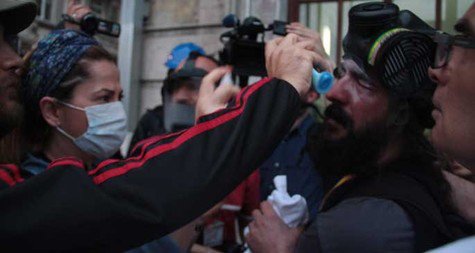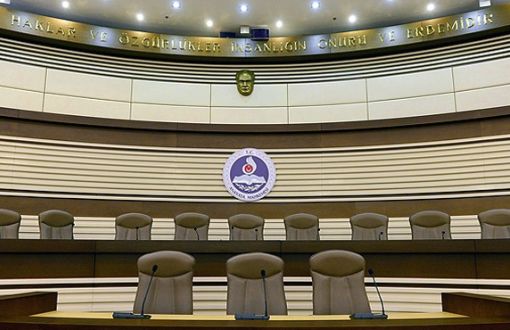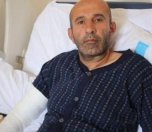Click to read the article in Turkish / Kurdish
The Constitutional Court has announced its decision on the case of Erdal İmrek, who was beaten by the police while he was on duty at the first anniversary of the 2013 Gezi resistance.
The court has ruled that freedom of expression, freedom of the press and the prohibition of treatment that does not comply with human dignity was violated.
On May 31, 2014, İmrek, who was working for the daily Evrensel at the time, was beaten by the police. Police officers also pepper-sprayed İmrek in the face. The prosecutor's office made a decision of non-prosecution for the police officers.
 Photo: Evrensel
Photo: Evrensel
Here are highlights from the court verdict:
- The applicant was injured during a period in which he was in custody of the state. In this case, it is up to the public authorities to prove that the use of force has become inevitable and that the power is proportionate, but this decision is not clarified in the decision of non-prosecution.
- In a criminal investigation into a case of ill-treatment, even the lack of collection of significant evidence capable of illuminating the case alone may undermine the consistency of the outcome achieved.
- The decision (decision of non-prosecution for police officers) was made on the ground that the police officers had not physically interfered with the applicant and that holding him by the arm was insufficient in terms of exceeding the limit of the use of force. This decision reveals that the conditions for the occurrence of ill-treatment were not objectively analyzed, as they were incompatible with forensic reports, photographs and other evidence in the file.
- Failure to take timely steps to identify the perpetrator of ill-treatment, the lack of effort to obtain all evidence that could shed light on the incident and ensure that those responsible can be identified, and the analysis of evidence not being compatible with the findings in the investigation reveals that the approach to the investigation, in general, is not sufficiently sensitive.
Steps not taken
- In the concrete incident, the photographs presented in the report submitted by the expert to the investigating authorities showed that the police officers surrounded a group of journalists and prevented them from moving with their shields and then moved the journalists away from the demonstrators by the method they called sweeping.
- The report has resolved the dialogue between journalists and police officers. Journalists told police officers that the cordoning process had to be terminated and that journalist duties were prevented, but the police officers continued to drive the journalists away from the demonstrators and squeezed pepper spray off the journalists who wanted to leave the police cordon.
- At this point, it is expected from the organs using the public power to show the reasonable reasons why the journalists, including the applicant, are prevented from performing their duties. Freedom of the press is vital.
Freedom of expression is vital
- Freedom of expression and freedom of the press apply to everyone, as emphasized in many judgments, and is vital for the Constitutional Court and for the functioning of democracy.
- It is clear that freedom of the press provides one of the best tools for communicating various opinions and attitudes to the public on issues of public interest and for creating an opinion on them. The examined application should focus on the issue of the protection of journalists in the field from violence during their duties.
- In the present case, the administration failed to provide sufficiently strong and coherent evidence to prove that it was absolutely necessary to prevent journalists from reporting and physical interference with the applicant.
- The applicant, who served as a journalist, did not prevent the police from performing their duties in relation to the demonstration in progress or acted as a demonstrator and did not use violence against the police or pose another threat.
- Only the applicant, who was doing his job, had been subjected to the above-identified treatment of the police, although he had made it clear that he was a journalist. The interference with the applicant was therefore not justified. (DB/VK)








